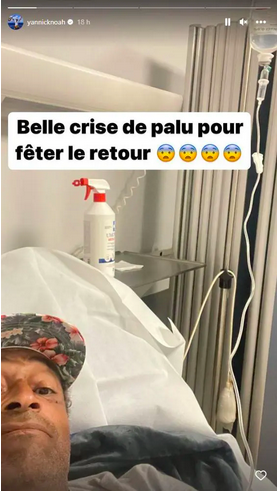Published on
Updated
Reading 2 mins.
Returning from a trip to Polynesia, singer and former tennis player Yannick Noah was hit by a severe attack of malaria. Out of trouble but weakened, the artist reassured his fans on his networks.
A vacation in paradise that ends in an attack of malaria, this is the misadventure that Yannick Noah is undergoing at this very moment, by his own admission on Instagram.
After a getaway to Tahiti, which the singer of 62 obviously took advantage of, a much more austere story was able to worry his fans on March 16: from a hospital bed, on a drip, and visibly tired, Yannick Noah captioned his photo of ‘A “Beautiful malaria crisis to celebrate the return”. The man, however, conceded in another post on March 18 to be “much better” even though he remains bedridden.

A relapse after only a few months
This is unfortunately not a first for the singer. In 2022, while he was on tour, Yannick Noah had already shared some secrets about his state of health on his Instagram account and in particular the fact that he had caught malaria for the first time. Before proceeding”I hope there will be no relapse.” A fear that has unfortunately materialized. The singer is nevertheless committed to the fight against malaria with the NGO Impact Santé Afrique (ISA). In May 2022, he thus justified his fight by the inequality of care that makes rabies especially in Africa:
“There are people who are lucky enough to have access to care, of which I am one, but I also know that there are others for whom it is much more difficult.
247 million cases of malaria worldwide.
Malaria is the most common parasitic infection in the world. According to the latest WHO figures, 247 million cases of malaria were diagnosed in 2021. The infection, potentially fatal if left untreated, is caused by several species of parasites belonging to the genus Plasmodium. The parasite is transmitted to humans through the bite of infected mosquitoes. The most affected region of the world remains Africa to date, but the tropics, Asia and Latin America are not spared, and going there puts you at risk.
According to the Institut Pasteur website, malaria begins with a fever 8 to 30 days after infection, which may or may not be accompanied by:
- Headache ;
- Muscle aches ;
- Of a weakening;
- Vomiting;
- diarrhea;
- Cough.
Typical cycles alternating fever, tremors with cold sweats and intense sweating can then occur.
A highly recommended preventive treatment
To travel a little more serenely to one of the regions affected by malaria, the Institut Pasteur recommends taking preventive treatment regularly, in particular for children and pregnant women who have an increased risk of severe attacks.
“Preventive treatment must be prescribed by a doctor. It takes into account the areas visited (risk, existence or not of resistance), the duration of the trip and also the person: age, pathological history, intolerance to antimalarials, possible drug interaction, pregnancy.
However, antimalarial drugs do not guarantee absolute protection against infection and it is also important to protect yourself from mosquito bites (mosquito nets, mosquito repellents, etc.).
There is also an antimalarial vaccine, the RTS,S/ASO1 vaccine recommended by the World Health Organization (WHO) but only for children living in regions where transmission is moderate to high, according to a 4-dose vaccination schedule. from the age of 5 months. To date, there is no vaccination recommendation for travellers.
